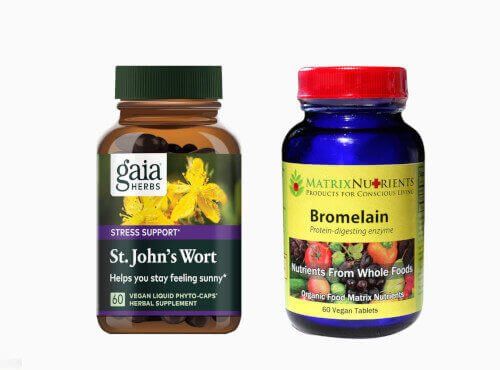Do Carpal Tunnel Herbal Supplements Work?
Table of Contents
- Do herbal supplements really help carpal tunnel syndrome?
- What is carpal tunnel syndrome?
- How carpal tunnel happens
- What carpal tunnel feels like
- Why people believe in carpal tunnel herbal supplements
- Common carpal tunnel herbal supplements
- Side effects
- Get serious help for carpal tunnel syndrome
- Summary
- FAQs
- About
Do herbal supplements really help carpal tunnel syndrome?
Do you take herbal supplements for carpal tunnel syndrome—or wonder if they actually help? You’re not alone.
Millions of people experience the pain, numbness, and tingling of carpal tunnel syndrome every year. And many turn to herbal remedies hoping for natural relief or to avoid surgery and long-term therapy.
It’s easy to understand why. Supplements are convenient, inexpensive, and seem harmless. Many people think, “It can’t hurt,” and give them a try—along with other home remedies like
ice baths or taping techniques—in the hope of easing discomfort. But do they really work?
Experts say probably not. Although herbal supplements are widely used, no high-quality clinical studies show that they effectively treat carpal tunnel syndrome. In fact, years of research reveal little—if any—benefit. The main problem is
poor-quality evidence: studies tend to be small, inconsistent, or poorly designed. As a result, the
National Institutes of Health (NIH) cannot confirm—or disprove—claims that these supplements help.
Meanwhile, far more effective
nonsurgical treatments are available today. In most cases, these options outperform
carpal tunnel surgery and offer lasting relief—without relying on unproven herbal remedies.
Carpal tunnel syndrome is a serious condition that deserves proper medical attention. Left untreated, it usually gets worse. That’s why the
National Academy of Medicine advises patients not to depend on supplements as a treatment for carpal tunnel syndrome, but instead to seek therapies proven to work.
What is carpal tunnel syndrome?
How carpal tunnel happens
The condition known as carpal tunnel syndrome is actually a neurological disorder of the median nerve. The
median nerve controls sensations from the fingers and palm of the hand.
The actual problem begins when you overwork your
flexor tendons. These are the ropy structures that pull your fingers and make them curl and grasp. The tendons run from the muscles in the forearm, through the wrist joint, and to the individual fingers.
Overworked tendons tend to
inflame and swell.
No one is really certain why this happens. But in the narrow space inside the wrist joint (called the "carpal tunnel"), the swelling pushes against the median nerve. The nerve runs directly adjacent to the tendons. As the tendons swell more and more, they eventually
crush
the median nerve.
What carpal tunnel feels like
Why people believe in carpal tunnel herbal supplements
It’s easy to see why so many people believe herbal supplements might help carpal tunnel syndrome. After all, most pain in the body comes from inflammation—and the same is true for carpal tunnel syndrome, which is caused by inflamed tendons crowding the narrow wrist tunnel.
So, the reasoning seems simple: if you can reduce inflammation, you should be able to reduce pain and other carpal tunnel symptoms.
There’s no question that certain foods and herbs have proven
anti-inflammatory properties. For decades, research has shown that natural compounds like curcumin (from turmeric), omega-3 fatty acids, and green-tea extracts can help the body manage inflammation in general. That’s why many people turn to them as “natural medicine” for joint or muscle pain.
However, despite these broad anti-inflammatory benefits, no credible scientific study has shown that any herbal supplement can directly affect inflammation inside the wrist or tendons affected by carpal tunnel syndrome. In other words, while these supplements may help the body’s overall inflammatory balance, they can’t specifically target the small, enclosed area of the carpal tunnel.
In short, easing the compression of the median nerve requires more than herbs—it takes direct, targeted treatment to the wrist itself.
Common carpal tunnel herbal supplements
Despite the evidence, many people still claim some anti-inflammatory substances can provide local relief. Today, the most popular carpal tunnel herbal supplements claiming to
reduce inflammation include:
- St. John’s wort
- Bromelain
- Capsaicin
- Turmeric
- Ginger
- Cloves
- Thyme
- White willow bark
- Frankincense
Side effects
Often, manufacturers will combine some of the above herbals together, or with other ingredients. The hope is to make the supplement more potent against inflammation - and more appealing to logic.
So if some people claim that carpal tunnel herbal supplements work (even though science says otherwise), why not just take them as a precaution? The problem with that is many herbal supplements can have
side effects. Some side effects are serious.
There are no requirements for herbal supplement manufacturers to report their side effects to the FDA. That's because the
FDA considers such products foods.
The most common side effects doctors see with carpal tunnel herbal supplements include:
- Allergic reactions
- Depressed breathing
- Nausea
- Drop in blood pressure
- Gastrointestinal problems
- Liver problems
- Abdominal cramps
- Heartburn
- Diarrhea
- Bloating
- Sleep disturbance
Get serious help for carpal tunnel syndrome
Carpal tunnel syndrome isn’t just a nuisance—it’s a genuine neurological disorder that requires proper medical attention. And while herbal supplements may sound appealing, they simply can’t provide the level of treatment this condition demands.
There’s no solid scientific evidence showing that supplements can reverse or even slow carpal tunnel syndrome. In most cases, they only drain your wallet while the condition quietly worsens. And as symptoms progress, treatment becomes more complicated and recovery takes longer.
That’s why it’s so important to act quickly. Don’t let valuable therapy time slip away. The key to real improvement is reducing inflammation and pressure inside the wrist tunnel—something that only
targeted therapy can achieve.
Summary
Many people turn to herbal supplements to ease the pain of carpal tunnel syndrome, believing that their natural anti-inflammatory effects might help. The logic sounds reasonable—but it doesn’t hold up under scientific scrutiny. To date, not a single credible medical study has shown that herbal supplements have any meaningful effect on carpal tunnel syndrome. In short, while “natural” may sound appealing, these remedies simply don’t address the real cause of the problem.
FAQs
Q: Do any herbal supplements actually cure or reverse carpal tunnel syndrome?
A: No. To date, there is no credible medical evidence showing that any herbal supplement can cure, reverse, or significantly improve carpal tunnel syndrome. The condition involves nerve compression inside the wrist, which cannot reliably be addressed by oral supplements alone.
Q: Can herbal supplements help reduce inflammation in the wrist?
A: While certain herbs and foods have demonstrated general anti-inflammatory effects in the body, there is no proof they can target inflammation inside the wrist’s narrow carpal tunnel. The confined anatomy limits how well such supplements can reach and affect the tendons or median nerve.
Q: Is it harmful to try herbal supplements while pursuing standard treatments?
A: In many cases, taking herbal supplements may delay seeking effective care, allowing the condition to worsen. Additionally, some supplements can carry side effects or interact with medications, so it's best to consult your doctor before combining them with conventional therapy.
About







